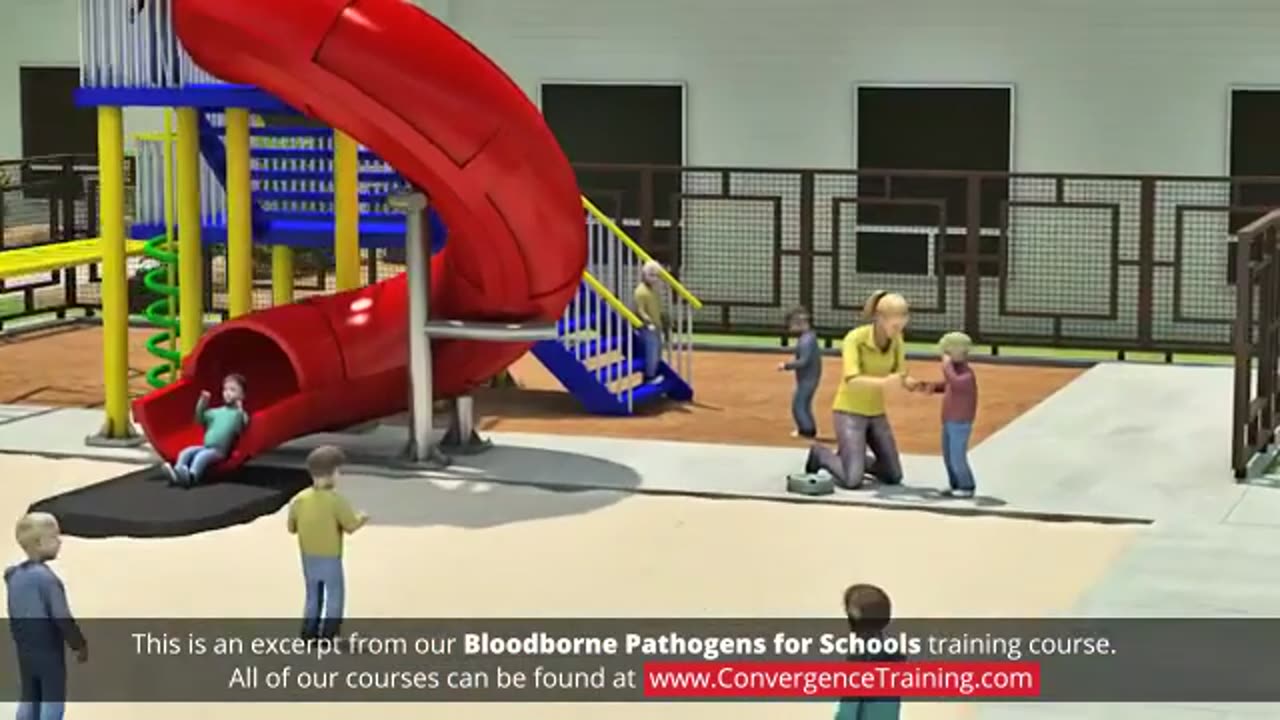Premium Only Content

Bloodborne Pathogens for Schools
### **Bloodborne Pathogens in Schools**
In schools, the risk of exposure to bloodborne pathogens is generally lower compared to healthcare settings but still exists, especially for teachers, custodians, nurses, and other staff who may come into contact with blood or bodily fluids.
### **Common Scenarios in Schools**
1. **Injuries on the Playground or in Classrooms**: Cuts, scrapes, or nosebleeds.
2. **Sports Injuries**: Contact sports can result in bleeding.
3. **Assisting Students with Medical Needs**: Handling diabetic care, bloody tissues, or assisting students with special health conditions.
4. **Handling Sharps**: Needles (diabetic care, epinephrine pens) or broken glass.
---
### **Risks for Staff and Students**
Bloodborne pathogens of concern include:
- **Hepatitis B (HBV)**
- **Hepatitis C (HCV)**
- **Human Immunodeficiency Virus (HIV)**
These can be transmitted if blood or bodily fluids come into contact with broken skin, mucous membranes (eyes, nose, mouth), or through sharps injuries.
---
### **Prevention Measures for Schools**
1. **Universal Precautions**:
- Treat all blood and bodily fluids as potentially infectious.
- Avoid direct contact with blood.
2. **Personal Protective Equipment (PPE)**:
- Staff should use gloves, face shields, or masks when handling blood or bodily fluids.
3. **Safe Cleanup Practices**:
- Use absorbent materials, disinfectants, and proper disposal containers (like biohazard bags or sharps containers).
- Immediately clean areas contaminated with blood using approved disinfectants.
4. **Proper Hand Hygiene**:
- Wash hands thoroughly with soap and water after handling blood or bodily fluids.
5. **Exposure Control Plan (ECP)**:
- Schools should develop an ECP that outlines:
- What to do in case of exposure.
- Who to contact.
- Post-exposure evaluation procedures.
6. **Training and Education**:
- Schools should provide **annual bloodborne pathogen training** for staff.
- Training should cover universal precautions, PPE use, and emergency response.
7. **Hepatitis B Vaccination**:
- Employers are required (per OSHA guidelines) to offer free Hepatitis B vaccinations to staff with potential exposure risks.
---
### **Steps for Handling Bloodborne Pathogen Exposure in Schools**
If a staff member or student is exposed:
1. **Immediate Response**:
- Wash the affected area with soap and water.
- Flush eyes, nose, or mouth if exposed.
2. **Report the Incident**:
- Notify the school nurse or administration.
3. **Seek Medical Attention**:
- Post-exposure evaluation, treatment, and follow-up testing (if needed).
---
### **Key Roles in Schools**
- **School Nurses**: Educate staff and oversee proper medical procedures.
- **Custodial Staff**: Ensure proper cleaning and disinfection of contaminated areas.
- **Teachers and Coaches**: Respond quickly to student injuries while following universal precautions.
Would you like resources for creating an **exposure control plan**, training materials, or posters for school staff?
-
 6:43
6:43
HSESafetyInformation
8 months agoLahori Chanay Recipe - Lahori Cholay Recipe - Chana Chana Masala
61 -
 9:58
9:58
Clintonjaws
12 days ago $0.07 earnedKaroline Leavitt's Response To 'The View' Host's Nasty Attacks Is Perfect
1.96K3 -
 24:23
24:23
World2Briggs
18 hours agoTop 10 Towns You Can Retire on $1900 a month in the Pacific North West.
3.19K3 -
 21:23
21:23
Lady Decade
14 hours ago $0.03 earnedThe Lost Sega Neptune Console Refuses To Die !
2.03K -
 17:14
17:14
ThinkStory
20 hours agoIT: WELCOME TO DERRY Episode 2 Breakdown, Theories, & Details You Missed!
4.84K -
 17:25
17:25
Real Estate
1 month agoThe Job Market Collapse IS HERE
3.87K4 -
 LIVE
LIVE
BEK TV
22 hours agoTrent Loos in the Morning - 11/05/2025
188 watching -
 LIVE
LIVE
The Bubba Army
21 hours agoUPS PLANE EXPLODES - What Went Wrong? - Bubba the Love Sponge® Show | 11/05/25
2,263 watching -
 16:38
16:38
James Klüg
19 hours agoFOOD STAMPS RAN OUT, Will People Loot?
19.1K30 -
 23:56
23:56
Producer Michael
17 hours agoBuying My Wife a $500,000 Diamond Necklace!
10.7K10